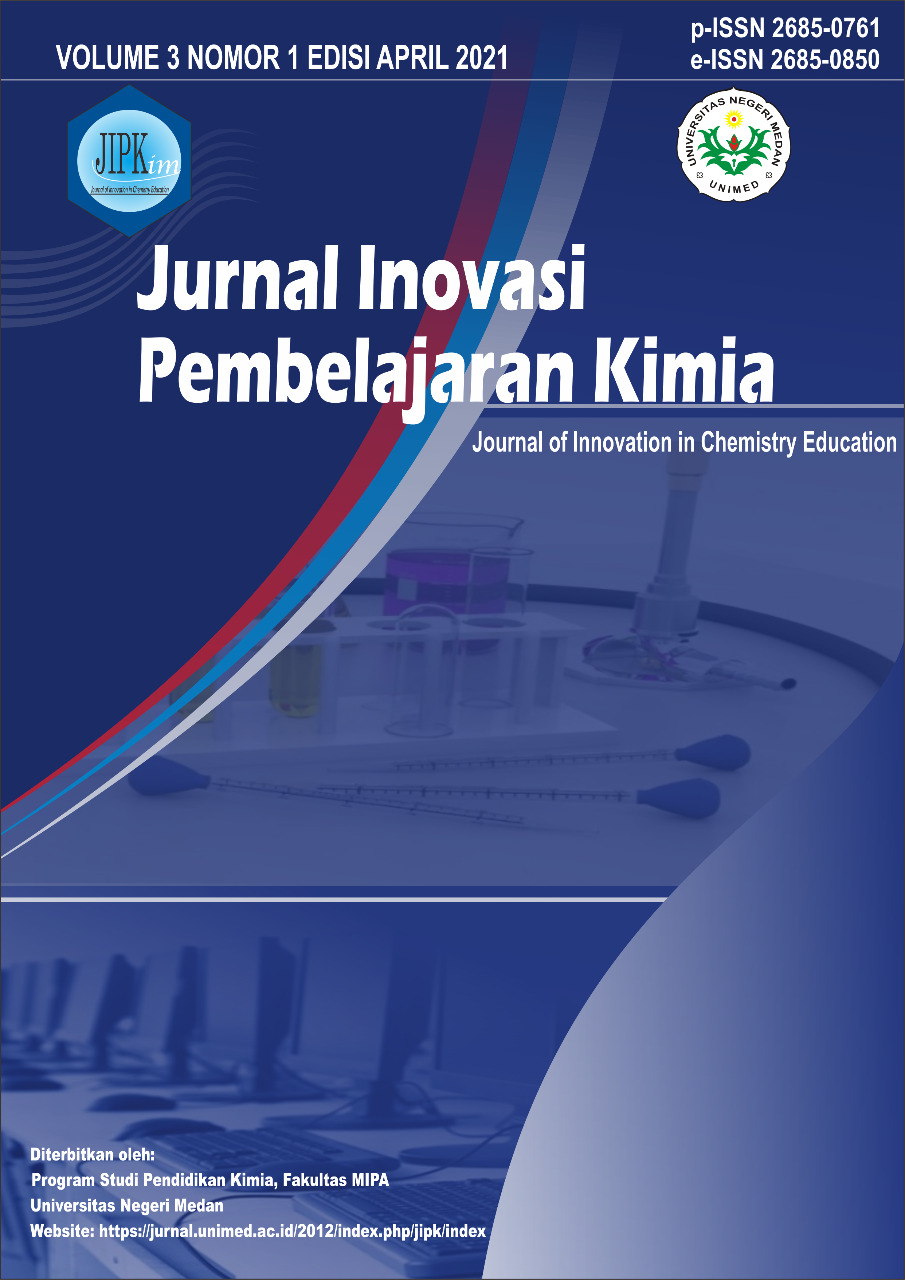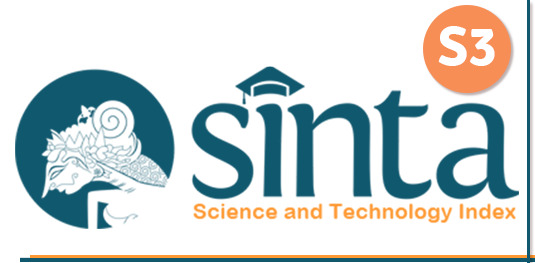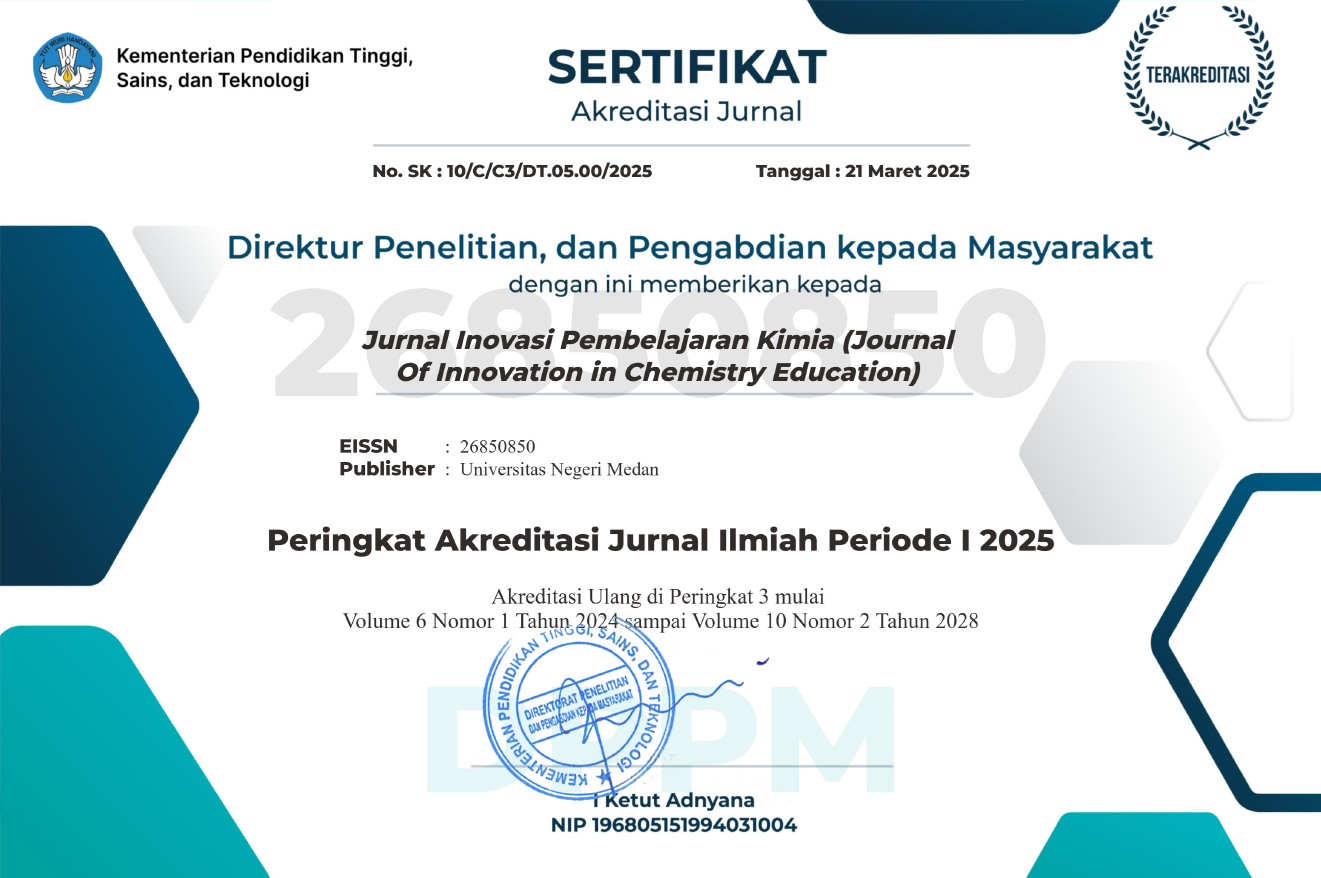Pengembangan Modul Berbasis Guided Inquiry Pada Pokok Bahasan Laju Reaksi
DOI:
https://doi.org/10.24114/jipk.v3i1.24100Keywords:
Keywords, Module, guided inquiry, module eligibility, module attractivenessAbstract
This study aims to design a guided inquiry-based module on the subject of reaction rates and to analyze the feasibility of a guided inquiry-based module on the subject of reaction rates. The method in this research uses the research and development or Research and Development method which is limited to only 5 stages, namely the data and information collection stage, the product planning stage, the initial product development stage, the initial field trial stage and the revision stage of the trial results. The research subject was a guided inquiry-based module. The object of research was the material reaction rate. The product developed was validated by 4 expert validators consisting of 2 material expert validators and 2 media expert validators. In addition, the responses of 2 chemistry teachers were also seen. Initial field trials were carried out by giving questionnaire sheets to 8 students. The results showed that the guided inquiry-based module on the subject of reaction rates was declared feasible after validation by material experts, media experts, teacher and student responses. Evaluation of material experts with an average percentage of 83.10% with the valid / feasible category, the assessment of media experts with an average percentage of 83.09% with the valid / feasible category, the percentage of teacher responses to 87.49% with the very interesting category and the percentage of responses 83.08% students with very interesting category.References
Aditia, M, T. dan Muspiroh, N. (2013). Pengembangan Modul Pembelajaran Berbasis Sains, Lingkungan, Teknologi, Masyarakat dan Islam (Saling Temasis) Dalam Meningkatkan Hasil Belajar Siswa Pada Konsep Ekosistem Kelas X di SMA NU (Nahdatul Ulama) Lemahabang Kabupaten Cirebon. Jurnal Scientiae Education. 2 (2).
Amarlita, D, M. (2019). Pengembangan Modul Praktikum Laju Reaksi Berbasis Inkuiri Terbimbing. UKHITAPRJNA Jurnal Ilmiah. 21 (1). 86-91.
Amin, S. (2013). Tinjauan Keunggulan dan Kelemahan Penerapan Kurikulum 2013 Tingkat SD/MI. Al Bidayah. 5 (2). 261-279.
Andromeda. dkk. (2018). Validitas dan Praktikalitas Modul Laju Reaksi Terintegrasi Eksperimen dan Keterampilan Proses Sains Untuk Pembelajaran Kimia di SMA. Jurnal Eksakta Pendidikan. 2 (2). 132-139.
Andromeda. Yerimadesi. Iwefriani. (2017). Pengembangan Lembar Kerja Siswa (LKS) Eksperimen Berbasis Guided Inquiry Materi Laju Reaksi Untuk Siswa SMA/MA. Jurnal Eksakta Pendidikan. 1 (1). 47-54.
Anisa, R. Rayendra, W, B. dan Bambang, S. (2018). Pengembangan Modul Pembelajaran Fisika Berbasis Learning Cycle 5 E Pokok Bahasan Getaran Harmonis Untuk Siswa SMA. Jurnal Pembelajaran Fisika. 7 (2). 181-188.
Ashadi. Imanah, I. dan Saputro, S. (2017). Pengembangan Modul Kimia Berbasis Inkuiri Terbimbing Pada Pokok Bahasan Termokimia Untuk SMA/MA Kelas XI. Jurnal Inkuiri. 6 (1). 161-174
Budiono, E. dan Susanto, H. Penyusunan dan Penggunaan Modul Pembelajaran Berdasarkan Kurikulum Berbasis Kompetensi Sub Pokok Bahasan Analisa Kuantitatif Untuk Soal-Soal Dinamika Sederhana Pada Kelas X Semester I SMA. Jurnal Pendidikan Fisika Indonesia. 4 (2). 79-87.
Sanjaya, W. (2006). Strategi Pembelajaran Berorientasi Standar Proses Pendidikan. Jakarta: Kencana.
Sayani, E. dan Ani, S. (2020). Pengaruh Model Pembelajaran Inkuiri Terbimbing Berbasis Pertanyaan Kritis Terhadap Hasil Belajar Siswa Materi Laju Reaksi. Jurnal Inovasi Pembelajaran Kimia. 2(2). 99-103.
Subawa, K. Kilo, A, L. dan Laliyo, L, A, R. (2018). Penerapan Model Learning Cycle pada Materi Laju Reaksi Untuk Meningkatkan Hasil Belajar. Jurnal ENTROPI. 13 (1). 51-58.
Sumarni, S. Santoso, B, B. dan Suparman, A, R. (2017). Pengaruh Model Pembelajaran Inkuiri Terbimbing Terhadap Hasil Belajar Kognitif Peserta Didi. Jurnal Komunikasi Pendidikan. 1 (1). 59-68.
Suryati. (2013). Pengaruh Model Pembelajaran LC Dipadu Diagram Alir Terhadap Kualitas Proses dan Hasil Belajar Kimia Siswa. Jurnal Kependidikan KimiaHydrogen. 1 (1). 14-20.
Susilo, A. Siswandari. dan Bandi. (2016). Pengembangan Modul Berbasis Pembelajaran Saintifik Untuk Peningkatan Kemampuan Mencipta Siswa Dalam Proses Pembelajaran Akuntanasi Siswa Kelas XII SMAN 1 Nogohimo 2014. Jurnal Pendidikan Ilmu Sosial. 26 (1). 50-56.
Wibowo, N. (2016). Upaya Peningkatan Keaktifan Siswa Melalui Pembelajaran Berdasarkan Gaya Belajar di SMK Negeri 1 Saptosari. Jurnal ELINUO. 1 (2). 128-139.













